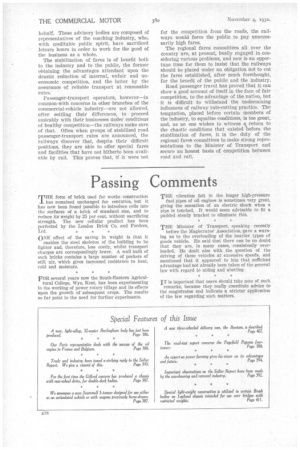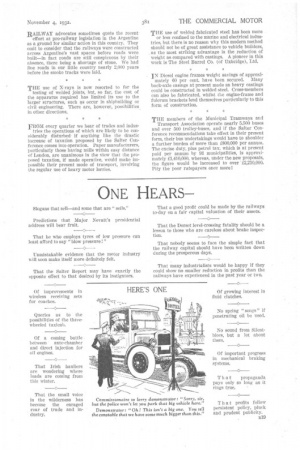Passing Comments
Page 36

Page 37

If you've noticed an error in this article please click here to report it so we can fix it.
TE form of brick used for works construction has remained unchanged for centuries, but it has now been found possible to introduce cells into the surfaces of a brick of standard size, and to reduce its weight by 25 per cent, without sacrificing strength. The new cellular product has been perfected by the London Brick Co. and Farriers, Ltd.
ONE effect of the saving in weight is that it enables the steel skeleton of the building to be lighter and, therefore, less costly, whilst transport charges are correspondingly lower. A wall built of such bricks contains a large number of pockets of still air, which gives increased resistance to heat, cold and moisture.
FOR several years now the South-Eastern Agricul tural College, Wye, Kent, has been experimenting in the working of power rotary tillage and its effects tmon the growth of subsequent crops. The results so far point to the need for further experiments.
THE vibration felt in the longer high-pressure
fuel pipes of oil engines is sometimes very great, giving the sensation of an electric shock when a pipe is touched. It would seem advisable to fit a padded steady bracket to eliminate this.
THE Minister of Transport, speaking recently before the Magistrates' Association, gave a warning as to the overloading of the heavier types of goods vehicle. He said that there can be no doubt. thatthey are, in many cases, consistently overloaded. He dealt also with the question • of the driving of these vehicles at excessive speeds, and mentioned that it appeared to him that sufficient advantage had not already been taken of the general law with regard to aiding and abetting.
IT is important that users should take note of such remarks, because they really constitute advice to the magistrates and indicate a stricter application of the law regarding such matters.
RAILWAY advocates sometimes quote the recent. effort at pro-railway legislation in the Argentine as a ground for similar action in this country. They omit to consider that the railways were constructed across Argentine's vast spaces before roads were built—in fact roads are still conspicuous by their absence, there being a shortage of stone. We had fine roads in our little country nearly 2,000 years before the smoke tracks were laid.
THE' use of X-rays is now resorted to for the testing of welded joints, but, so far, the cost of the apparatus required has limited its use to the larger structures, such as occur in shipbuilding or civil engineering. There are, however, possibilities in other directions, FROM every quarter we hear of trades and indus tries the operations of which are likely to be considerably disturbed • if anything like the drastic increase of taxation proposed by the Salter Conference comes into operation. Paper manufacturers, particularly those having mills within easy distance of London, are unanimous in' the view that the proposed taxation, if made operative, would make impossible their present mode of transport, .involving the regular use of heavy motor lorries. THE use of welded fabricated steel has been more or less confined to the m'arine and electrical industries, but there is no reason why this modern method should not be of great assistance to 'vehicle builders, as the most striking advantage is the reduction of weight as compared with castings. A pioneer in this work is The Steel Barrel Co. (of Uxbridge), Ltd.
IN Diesel engine frames weight savings of approxi mately 60 per cent, have been secured. Many back-axle casings at present made as heavy castings could be constructed in welded steel. Cross-members can also be fabricated, whilst the engine-frame and fulcrum brackets lend themselves particularly to this form of construction.
THE members of the Municipal Tramways and Transport Association operate nearly 5.500 buses and over 500 trolley-buses, and if the Salter Conference recommendations take effect in their present form, their bus undertakings would have to shoulder a further burden of more than 1800,000 per annum. The excise duty, plus petrol tax, which is at present paid per annum by 91 municipalities, is approximately 11,410,000, whereas, under the new proposals, the figure would he increased to over '12,210,000. Pity the' poor ratepayers once more !




































































































